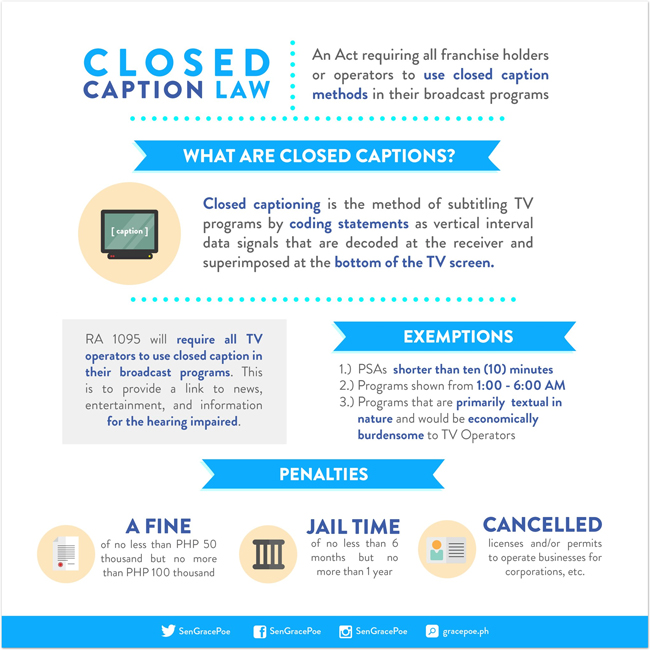Closed Captioning Requirement for Broadcast TV in the Philippines
Updated: August 7, 2024
On July, 21, 2016, the Philippines passed its first official legislation requiring closed captioning for broadcast TV.
Republic Act No. 10905, entitled “An Act Requiring All Franchise Holders or Operators of Television Stations and Producers of Television Programs to Broadcast or Present Their Programs With Closed Caption Options,” was sponsored by Senator Grace Poe.
As chairperson of the Senate Committee on Public Information and Mass Media, Senator Poe sought greater inclusion for people with disabilities.
“One of the objectives of this legislation is to provide our hearing-impaired access to news, entertainment, and information in promoting their welfare.”
Full realization of the goals of the measure is consistent with the Philippines Government’s commitment when it ratified the Convention on the Rights of Persons with Disabilities in 2008, which states that there should be full accessibility and recognition of the linguistic and cultural identity of persons with disability.
The measure was originally filed in a senate bill in May 2014, received approval in May 2016, and lapsed into law in July 2016.
Beginner’s Guide to Closed Captioning ✨
Captioning Requirements
Video producers and broadcasters are required to include closed captioning on TV programming in the Philippines. This applies to both news broadcasts and pre-recorded programs.
The National Telecommunication Commission (NTC) and the Movie and Television Review and Classification Board (MTRCB) are charged with enforcing these rules at the federal level.
Violators of the law could be subject to fines between PHP 50K-100K ($1000-$2200 USD), 6-12 months of jail time, and cancellation of broadcasting licenses.
Who exactly is liable for those fines and jail time?
Read the full text of the Republic Act No. 10905
Captioning Exemptions
As with closed captioning laws in other nations, the Philippines’ rules offer some exemptions. The captioning law excludes:
- Public service announcements that are less than ten minutes long
- Content that airs between 1 am and 6 am
- Programs that are primarily textual
- Cases where compliance would be economically burdensome
This last condition is strikingly similar to the “undue burden” clause in the United States’ Americans with Disabilities Act.
Senator Poe tweeted the following infographic to educate the public about the new captioning rules:
Everything you need to know about closed captions 👇








